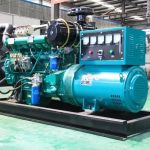Diesel Generators for Hot Climates Ensuring Reliable Power Supply in Challenging Environments

Introduction
In hot climates, reliable power supply is essential for various applications ranging from residential and commercial to industrial and agricultural. Diesel generators have long been a popular choice for providing backup power in such environments due to their robustness, durability, and ability to withstand extreme conditions. This article explores the importance of diesel generators in hot climates, their key features, maintenance requirements, and best practices for optimal performance.
Importance of Diesel Generators in Hot Climates
Hot climates present unique challenges for power generation due to high temperatures, humidity, and dust levels that can affect the performance and efficiency of electrical equipment. In such environments, power outages are not uncommon, and having a reliable backup power source is crucial to ensure uninterrupted operations.
Diesel generators are well-suited for hot climates for several reasons. Firstly, diesel engines are known for their durability and reliability, making them ideal for continuous operation in challenging conditions. The robust construction of diesel generators allows them to withstand high temperatures and humidity levels without compromising performance.
Moreover, diesel fuel is less volatile than gasoline, making it a safer option for use in hot climates where the risk of fire is higher. Diesel generators also offer better fuel efficiency and longer run times compared to other types of generators, making them a cost-effective solution for prolonged power outages in hot climates.
Key Features of Diesel Generators for Hot Climates
When selecting a diesel generator for use in hot climates, several key features should be considered to ensure optimal performance and reliability. 200kw diesel generator for remote monitoring stations of the essential features to look for include:
1. Cooling System: A robust cooling system is crucial for maintaining the optimal operating temperature of the diesel engine in hot climates. Air-cooled and liquid-cooled systems are the two primary types of cooling systems used in diesel generators. In hot climates, liquid-cooled systems are preferred as they offer better heat dissipation and temperature control.
2. Enclosure: The generator enclosure plays a vital role in protecting the unit from environmental factors such as dust, moisture, and extreme temperatures. In hot climates, it is essential to choose an enclosure that is weatherproof and adequately ventilated to prevent overheating.
3. Fuel Efficiency: Diesel generators should be designed for optimal fuel efficiency to minimize operating costs in hot climates where fuel consumption can be higher due to increased power demand. Look for generators with advanced fuel injection systems and electronic controls for better fuel management.
4. Emissions Control: In hot climates, air quality can be a concern, and diesel generators must comply with emission standards to reduce their environmental impact. Select generators that are equipped with emission control technologies such as exhaust aftertreatment systems to minimize harmful emissions.
Maintenance Requirements for Diesel Generators in Hot Climates
Proper maintenance is essential to ensure the reliable performance of diesel generators in hot climates. Regular maintenance checks and servicing help prevent breakdowns, extend the lifespan of the generator, and optimize fuel efficiency. Some key maintenance tasks for diesel generators in hot climates include:
1. Cooling System Inspection: Check the cooling system regularly for leaks, blockages, or signs of wear. Clean the radiator and cooling fins to ensure proper heat dissipation and prevent overheating.
2. Fuel System Maintenance: Keep the fuel tank clean and free of contaminants that can clog the fuel lines and filters. Regularly replace fuel filters and check for water or sediment in the fuel tank.
3. Oil and Filter Changes: Regularly change the engine oil and filters according to the manufacturer's recommendations. Clean oil is essential for lubricating the engine components and ensuring smooth operation.
4. Battery Inspection: Check the battery terminals, cables, and electrolyte levels regularly to ensure proper functioning of the starting system. Clean the terminals and tighten any loose connections to prevent starting issues.
5. Air Filter Replacement: Clean or replace the air filter as needed to prevent dust and debris from entering the engine and causing damage. A clogged air filter can reduce engine performance and fuel efficiency.
Best Practices for Optimal Performance of Diesel Generators in Hot Climates
To maximize the performance and efficiency of diesel generators in hot climates, the following best practices should be followed:
1. Proper Sizing: Ensure the diesel generator is appropriately sized for the power requirements of the load to be connected. Undersized generators can lead to overheating and reduced efficiency, while oversized generators may consume more fuel than necessary.
2. Regular Load Testing: Conduct regular load tests to simulate real-world operating conditions and verify the generator's ability to handle the connected load. Load testing helps identify potential issues and ensures the generator is operating at optimal performance levels.

3. Remote Monitoring: Implement a remote monitoring system to track the performance and status of the generator in real-time. Remote monitoring allows for early detection of issues, preventive maintenance scheduling, and timely response to alarms or alerts.
4. Fuel Quality Control: Use high-quality diesel fuel from reputable suppliers to prevent contamination and ensure proper engine operation. Monitor fuel levels and replenish the tank regularly to avoid running out of fuel during power outages.
5. Emergency Preparedness: Develop a comprehensive maintenance plan and emergency response protocol to address unforeseen events such as extreme weather conditions or equipment failures. Regularly review and update the emergency plan to adapt to changing circumstances.
Conclusion
Diesel generators play a crucial role in providing reliable backup power in hot climates where power outages can disrupt essential services and operations. By selecting diesel generators with the right features, performing regular maintenance checks, and following best practices for optimal performance, users can ensure uninterrupted power supply and protect their investments in challenging environments. With proper care and attention, diesel generators can continue to deliver reliable power for years to come, even in the harshest of hot climates.
